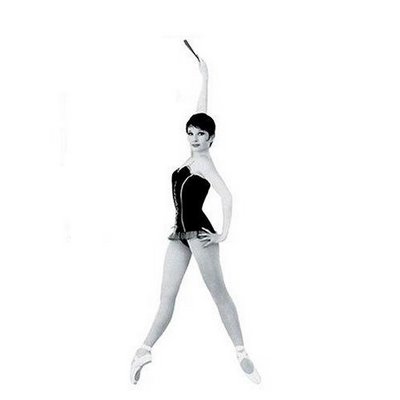
And you dance like Zizi Jeanmaire
Peter Sarstedt Where Do You Go To (My Lovely).
Renée Marcelle Jeanmaire, known as Zizi Jeanmaire, (born April 29, 1924) is a ballet dancer and wife of renowned dancer and choreographer Roland Petit. She became famous in the 1950s because of her titular role in the ballet Carmen, produced in London in 1949.
Born in Paris, France, she met her future husband and long-time collaborator Roland Petit at the Paris Opera Ballet at the age of nine. In 1954 they married, and their successful shows put her on the road to stardom. By this time she was the prima ballerina at Les Ballets des Champs-Elysées. She became noted for her energy and passion.
This led to a brief stint in Hollywood (where she was credited as Jeanmaire), appearing in the musicals Hans Christian Andersen (1952) and Anything Goes (1956). After that, she concentrated on ballet, producing more than 60 shows with Petit.
American artist Joseph Cornell was obsessed with Jeanmaire, although they only spoke briefly when he visited her dressing room after a performance of Carmen, he treasured her autograph, he kept a folder of Jeanmaire clippings and pictures and he staged a personal tribute to her at his gallery: La Lanterne Magique du Ballet Romantique by Joseph Cornell.
Marlene Dietrich was born Maria Magdalene Dietrich in Berlin-Schöneberg, Germany to Louis Erich Otto Dietrich and Wilhelmina Elisabeth Josephine Felsing on December 27, 1901. Nicknamed "Lena" within the family, she contracted her two first names to form the then-unusual name, Marlene, when she was still a teenager. Marlene studied the violin before starting work as a chorus girl and actress for Max Reinhardt in theatre productions in Berlin and Vienna throughout the 1920's.
Marlene made her film debut in 1923. In 1929, she got the role of "Lola-Lola" in UFA's production, The Blue Angel (1930), which was one of the first European sound films. The film was directed by Josef von Sternberg.
She then moved to Hollywood to make Morocco, for which she received her only Oscar nomination. Her most lasting contribution to film history was as the star in several films directed by von Sternberg in the pre-Code early 1930s, such as The Scarlet Empress and Shanghai Express, in which she played "femmes fatales". She gradually broadened her repertoire in Destry Rides Again, The Spoilers, A Foreign Affair, Witness for the Prosecution, Touch of Evil and Judgment at Nuremberg.Dietrich sang in several of her films (most famously in von Sternberg's The Blue Angel, in which she sings "Falling In Love Again"("Ich bin von Kopf bis Fuss auf Liebe eingestellt"), having made records in Germany in the 1920s. Following a slowdown in her film career, she made a number of records first for Decca, Elektrola, EMI, and for Columbia.
Dietrich died peacefully of natural causes May 6, 1992, at the age of 90 in Paris, France. A service was conducted at La Madeleine in Paris before 3,500 mourners and a crowd of well-wishers outside. Her body, covered with an American flag, was then returned to Berlin where she was interred at the Städtischer Friedhof III, Berlin-Schöneberg, Stubenrauchstraße 43-45, in Friedenau Cemetery, not far from the house where she was born.
****************
"Where Do You Go To (My Lovely)" was a #1 hit in the UK charts for 4 weeks in 1969 and was awarded the 1969 Ivor Novello Award, together with David Bowie's Space Oddity.
The song is about a girl named Marie-Claire from the "back streets of Naples" who grows up to become a member of the jet set, and lives in Paris.It is often suspected that the name Marie-Claire is inspired by the originally French Marie Claire magazine, a women's fashion weekly first published in 1937. One theory says that this song is about the Italian star Sophia Loren, who was abandoned by her father and had a poverty stricken life in Naples.


